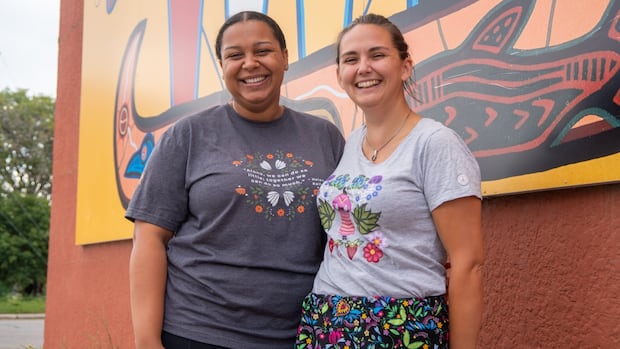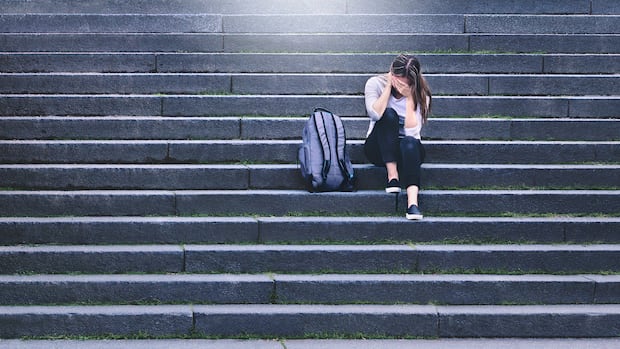Ashley Wilkinson has found racism is an ongoing challenge in health-care settings in Canada, which is why the PhD candidate at the University of Northern British Columbia is getting the first-hand accounts of Black and Indigenous people who say they’ve experienced it.
For her doctoral work, Wilkinson, who’s also a research co-ordinator at Lakehead University in Thunder Bay, Ont., has been interviewing unhoused people in various Canadian communities to learn if racism is impacting their efforts to get proper health care.
“I’ve heard everything from micro-aggressions, racial slurs, physical violence, a lot of assumptions being made about people [regarding] substance use and the challenges that they’re facing, just based on the fact that they’re Indigenous,” said Wilkinson.
Across the board, all of these interactions have made people very hesitant to go back and seek care.– Ashley Wilkinson, PhD candidate, University of Northern British Columbia
So far, she’s met with clients at Positive Living North in Prince George, B.C., and the Calgary Drop-In Centre. This week, she’s in Thunder Bay to speak with people at Shelter House, which offers overnight accommodations on the city’s south side.
“Across the board, all of these interactions have made people very hesitant to go back and seek care,” Wilkinson said of the health-care experiences shared with her.
“There’s been a lot of mistrust historically as well for these communities, and so the experiences that they’re having really do have an impact on their care-seeking behaviours moving forward.”
There is ample research that supports Wilkinson’s findings. For example, according to data from a 2024 Statistics Canada survey, about one in five Indigenous people reported experiencing unfair treatment, racism or discrimination from a health-care professional over the previous year.
As well, a Public Health Agency of Canada report from 2020 found that discrimination against Black communities is deeply entrenched in the country’s institutions, policies and practices — as a result of European colonization in Africa and the legacy of slavery, which was legal in Canada until 1834.
Researcher examines racism in healthcare settings while in Thunder Bay
Clients at Thunder Bay’s Shelter House are informing research on racism within healthcare settings against Black and Indigenous people experiencing homelessness. CBC’s Sarah Law spoke with University of Northern British Columbia PhD candidate – and research coordinator at Lakehead University – Ashley Wilkinson, to learn more.
Wilkinson hopes her research can be used to help inform public health-care policies, but she also wants the clients and communities that have participated to have access to her findings.
“We know that often, long reports sit on shelves and they don’t get read. They’re also not accessible to community individuals for whom English might not be their first language or individuals with varying literacy levels.”
The way in which research on this topic has been done has itself also caused harm among these populations, she added, “so I really want to have this project done in a good way where people walk away feeling like, ‘I am doing something’ with that story that they’ve shared.”
Making research accessible
In B.C., since a lot of research is based in Vancouver, Wilkinson wanted to also hear from people in smaller communities, she said.
As Thunder Bay is a central hub in northwestern Ontario, many clients at Shelter House have participated in research, said Champagne Thomson, the organization’s development manager.

“We’ve seen a very large influx in interested individuals wanting to participate, which is incredible, as well as some individuals who have shared their experiences and said, ‘This is the first time anyone’s ever taken me seriously.
“‘This is the first time I’ve been able to sit across the table with another racialized individual who’s listening to me and not speculating about, was it racism or was it not.'”
Wilkinson has interviewed about two dozen people so far, with the goal of conducting between 45 and 60 interviews.
To make her research accessible, Wilkinson said, she plans to create infographics and shorter, plain language-style reports for participants.
“Thunder Bay is a hotspot for a lot of research, and I don’t think a lot of it ends up coming back to the individuals that that information was extracted from,” added Thomson.
“When we’re planning, when we’re looking at things, when we’re investing in different institutions and types of care, I think it’s really important that individuals with these lived experiences are able to see their contributions reflected in how that goes forward.”
‘It’s about giving something back’
Building relationships is a big part of Wilkinson’s project.
In Prince George, after interviewing individuals, she participated in harm reduction outreach. Across Calgary and Thunder Bay, she’s served meals to hundreds of clients “because I want that relationship in each community and with each organization to be reciprocal.”
“It’s not just about me coming in and extracting that data. It’s about giving something back, both now and later at the end of the project.”
Before each interview, she offers Indigenous participants tobacco and makes sure all the clients are fed and hydrated. She also gives them a cash honorarium and homemade jam “because their time is valuable and their time is worth something.”
After finishing her work in Thunder Bay, Wilkinson will conduct interviews at a Black homeless-serving organization in Toronto.
“As a Black researcher, a Black scholar coming from the [Greater Toronto Area], I think that’s going to be a really impactful experience,” she said.
“In order to create meaningful change, we need people to recognize that the racism we’re seeing in our health-care system is pervasive, and by having all of these stories, there’s no denying that racism exists anymore — and that’s really my goal for this project.”







